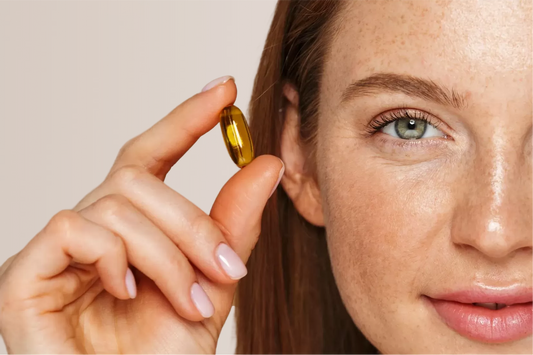What Are the Most Important Vitamins for Health?
What Are the Most Important Vitamins for Health?
Vitamins are nutrients necessary to keep our bodies in their best shape. They will help boost our immune system, keep our skin and hair healthy, support mental clarity, and ensure that our organs work properly. Since they do not get produced naturally by the body (except vitamin D), they have to be supplemented through food or supplements.
We will go over the most important vitamins concerning your health, their benefits, and how you can get them through various sources, among which are high-quality supplements from B. Health.
Types of Vitamins
Vitamins can be divided into two main types: fat-soluble and water-soluble.
Fat-soluble vitamins dissolve in fat and are mainly stored in the liver and in fatty tissues. The common fat-soluble vitamins are vitamins A, D, E, and K. It is important not to overingest these vitamins because of their storage in the body.
Water-soluble vitamins are those that dissolve in water and are excreted by the body rather than stored. They are regularly replenished by food and supplementation. The B vitamins and vitamin C are considered water-soluble, and they serve in very key roles concerning metabolism, energy production, and immune function.
Each of the vitamins has a particular function, and it is vital to understand their benefits independently.
Vitamins for Memory
Vitamins have a great influence on memory and cognitive function. Some vitamins are known to improve brain health and support memory, which is vital for mental clarity and overall cognitive performance.
Vitamin B12 is among the most critical vitamins that serve the brain. It takers care of the nervous system and aids in the formation of red blood cells. A deficiency can lead to loss of memory, fatigue, and confusion. You can find B12 in animal products like meat, fish, and eggs or take supplements for adequate levels.
Vitamin E: Vitamin E, an antioxidant, helps in maintaining brain cells healthy and cognitive abilities intact. Research also indicates that sufficient intake of vitamin E may slow the rate of cognitive decline in particular among the elderly.
Folic Acid (Vitamin B9): Folic acid is highly important for the proper development and functionality of the brain. It contributes to neurotransmitter synthesis and is associated with lower risks for cognitive decline and loss of memory. The best sources of folic acid include green leafy vegetables, legumes, and fortified cereals.
To improve your memory and clarity of mind, supplement with products offering these essential vitamins, which are available at B. Health.
Vitamins for Immune System
One needs a strong immune system in order to fight against infections and ailments. Certain vitamins help to enhance and regulate immune system responses for one's health all year long.
Vitamin C: While vitamin C is more recognized for its immune function, enhancing the production of white blood cells responsible for fighting infections, it also supports the skin-a barrier that provides defense against harmful bacteria and viruses. The best sources of vitamin C include citrus fruits, strawberries, and bell peppers.
Vitamin D: Vitamin D is also known as the "sunshine vitamin" and has a role in modulating immune responses, enhancing the body's defense against pathogens. Its deficiency has been associated with susceptibility to infections, especially respiratory ones. Vitamin D is found in fortified foods, fatty fish, or directly from sunlight.
Vitamin A :plays an important role in keeping the mucous membranes lining the respiratory system healthy. Mucous membranes act as a line of defense in infection prevention. Moreover, Vitamin A is helpful in the visual and integumentary aspects of the human body. Rich sources for vitamin A are carrots, sweet potatoes, and spinach.
for hair and nails vitamins
Apart from all that, vitamins help in the maintenance of good hair and nails. At times, deficiency of specific vitamins results in hair thinning, brittleness, or slower growth in nails. Here are some vitamins for keeping hair and nails in prime condition:
Biotin - Vitamin B7: Biotin is effective in keeping hair and nails strong. It assists with the production of keratin, which is a major protein found in the hair and nails. A deficiency of biotin leads to hair falling out and brittle nails. One can get biotin from eggs, almonds, and whole grains or from vitamin supplements by B. Health.
Vitamin D: A deficiency in vitamin D has been linked to hair loss, particularly in individuals with a condition called alopecia areata. Supplementing with vitamin D can help restore hair growth and improve the health of your nails.
Vitamin E: is considered an antioxidant because it helps to improve the flow of blood, therefore helping in nourishing the hair follicles and hence giving one a healthy look of hair growth. The nails are strong because vitamin E reduces oxidative stress's impact on the cells in your nails.
Sources of Vitamins
While vitamins are widespread in different foods, getting daily recommended allowances may sometimes be impossible due to reliance upon diet. Here are a few food sources of significant vitamins:
Vitamin A: liver, carrots, sweet potatoes, and spinach are some examples of the food rich in Vitamin A.
Vitamin B: Complex: whole grains, eggs, dairy products, and leafy greens
Vitamin C: Citric fruits, strawberries, bell peppers, broccoli
Vitamin D: oily fish, fortified dairy products, and sunlight
Vitamin E: Nuts, seeds, spinach, and broccoli.
However, if your diet does not meet the requirement, then supplements can be an excellent way to fill the gap. At B. Health, you can find a wide variety of high-quality vitamin supplements that meet all of your health needs, whether for cognitive support, immune health, or beauty.
Conclusion
Maintaining a healthy lifestyle requires ensuring that you're getting the right nutrients, including vitamins, to support various bodily functions. From boosting memory and strengthening the immune system to improving hair and nail health, vitamins are essential for overall wellness.
FAQs:
How can I get enough vitamins naturally?
You can get vitamins by eating a variety of nutrient-dense foods, including fruits, vegetables, lean proteins, and healthy fats.
Should I take supplements if I eat a balanced diet?
Generally, a balanced diet provides most of the vitamins you need. Supplements may be necessary if you have dietary restrictions or certain health conditions.



